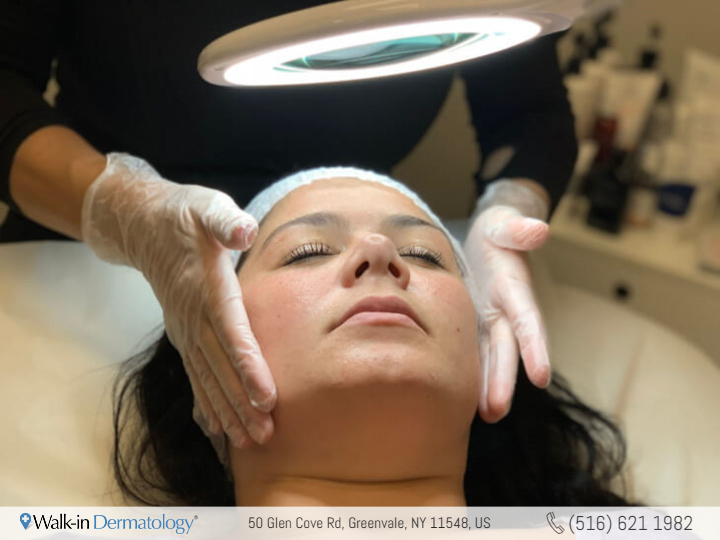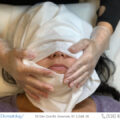Tues: 8:30am - 3:00pm
Wed: 12:00pm - 6:00pm
Thurs: 8:30am - 3:00pm
Fri: Closed
Sat: 8:30am - 12:30pm
Sun: Closed
Greenvale, NY 11548
Can Stress and Anxiety Affect Your Skin?


Feeling stressed out and anxious can become noticeable when you look in the mirror.
Both can impact the health of your skin.
Anxiety is known to trigger production of the stress hormone cortisol. This changes your skin pores and increases skin oil production. Pores become clogged by the oil, bacteria festers and acne begins to form. The stress-related hormone called CRH, or corticotrophin-releasing hormone, is another culprit known to cause acne.
Patients with certain skin conditions have been shown to have higher instances of anxiety and stress. The conditions tend to subside as stress levels go down, then flare up again at new stressful moments.
Eczema, hives, psoriasis, rosacea, picking at the skin and more conditions can all be caused by an increase in stress levels and anxiety. The same goes for alopecia (hair loss), vitiligo (depigmented white spots on the skin) and trichotillomania (hair pulling).
When triggered by stress, these skin conditions and behaviors are the body’s physical response to feeling threatened or no longer safe. Short-term stress, like having a really bad day at work, is not likely to cause skin problems. But working at a job that makes you miserable, day after day, may over time take a toll on a person’s health and skin condition.
Effective treatments are available for all of the skin conditions known to be caused by stress and anxiety. But to prevent these conditions from coming back, it’s also important to tackle and eliminate the underlying causes of stress and anxiety.
Antidepressants, relaxation therapy and counseling can sometimes alleviate the underlying psychological conditions causing stress. This is especially important if the anxiety is triggering involuntary and compulsive tics such as scratching, hair pulling or picking at the skin.
Nearly 4 percent of adults suffer from trichotillomania, or hair pulling. In extreme cases people make themselves bald by uncontrolled hair pulling. Although scientists are not sure what causes trichotillomania, stress is known to make it worse. In addition, compulsive behaviors such as scratching and picking at the skin can lead to wounds, infections and scarring.
Stress is especially likely to cause flare-ups of psoriasis, an inflammatory disease that makes skin cells multiply 10 times faster than normal, causing a scaly rash to appear. The same is true for the skin rash eczema. Stress can worsen outbreaks of eczema, which causes patches of skin to become inflamed, itchy, red, cracked, and rough. Blisters may also appear.
Rosacea is another common skin condition often caused or worsened by stress. It causes redness and visible blood vessels across the face. Small, red, bumps resembling pimples are also a symptom of rosacea. These symptoms may flare up for weeks or even months and then disappear for a while only to return. Although rosacea can affect anyone, the skin condition is most common in middle-aged women who have light skin, according to the Mayo Clinic.
In a cruel twist, the stress of seeing these rashes on their skin may cause people to become even more stressed, worsening the condition.
Research shows that the emotional response to stress and anxiety can cause all sorts of health problems beyond skin conditions. Stress can also cause flare-ups and worsen pre-existing conditions.
For stress-related acne, try using an over-the-counter topical ointment containing salicylic acid, which sloughs away dead skin cells that clog pores, leading to pimples. Clean acne-prone areas to remove skin oils and use a good moisturizer.
For persistent acne and more serious skin problems you’ll want to see a board-certified dermatologist.
Lack of sleep makes it worse. It can be a vicious cycle: you feel stressed so you can’t sleep. Being unable to sleep makes you tired and irritable, worsening the stress. Lack of sleep also triggers skin conditions such as the appearance of fine lines and wrinkles, and those dark circles under the eyes.
Telogen effluvium is another condition linked with stress that causes a decrease in the number of hair follicles growing hair on the scalp. This leads to hair loss.
Even less serious skin conditions can still crop up and annoy when we are anxious. Being overwhelmed with stress is a trigger for dry skin, according to the Mayo Clinic. Those tell-tale patches of dry, itchy, inflamed skin blooming across the body are often the physical manifestation of stress.
Getting the Best Treatment
The good news is, we’ve taken the stress out of seeing a dermatologist. You don’t have to look far for excellent dermatology services. And now there’s no waiting.
In many parts of New York and throughout the country, patients often wait weeks before they can see a board-certified dermatologist and receive a diagnosis, much less actual treatment.
That’s no longer necessary.
At Walk-in Dermatology, patients can see a board-certified dermatologist seven days a week. Our dermatologists will evaluate your skin and answer all your questions. We will work with you to set up a treatment plan to address your skin condition and get at the root cause of the condition – all convenient to your schedule.
No more waiting days or even weeks to see a dermatologist. Walk-in Dermatology is here to serve you. We are open and ready to help you regain healthy skin that positively glows with a youthful look.
Learn more: Is Face Paint Bad for Your Skin?








